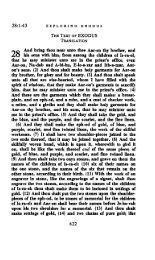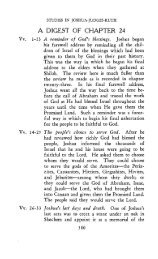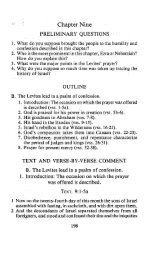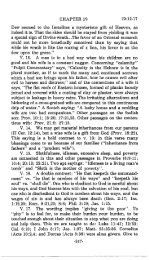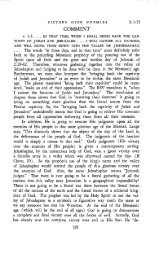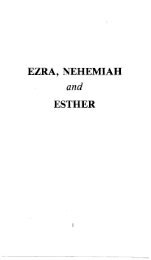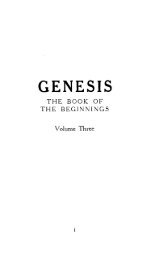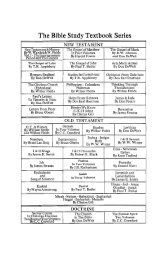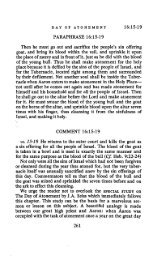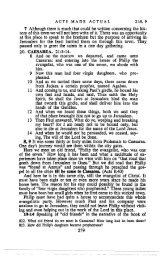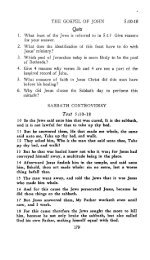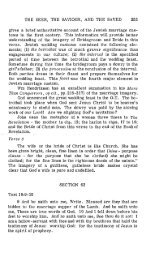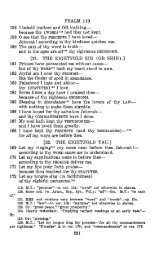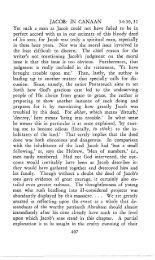Studies in the Psalms Vol 2 Part 2 - Only The Word
Studies in the Psalms Vol 2 Part 2 - Only The Word
Studies in the Psalms Vol 2 Part 2 - Only The Word
Create successful ePaper yourself
Turn your PDF publications into a flip-book with our unique Google optimized e-Paper software.
STUDIES IN PSALMS<br />
EXPOSITION<br />
<strong>The</strong> marked structural peculiarities of this psalm are prolbably<br />
best expla<strong>in</strong>ed by <strong>the</strong> supposition that it was at first <strong>the</strong><br />
soliloquy of an <strong>in</strong>dividual, and was afterwards adapted for national<br />
use on two successive occasilons. <strong>The</strong> first and last stanzas<br />
(vers. 1-11 and 23-28) <strong>in</strong> all likelihood constituted <strong>the</strong> orig<strong>in</strong>al<br />
psalm. <strong>The</strong> former of <strong>the</strong>se is ma<strong>in</strong>ly a prolonged compla<strong>in</strong>t,<br />
which may well have been written by or for K<strong>in</strong>g Hezekiah,<br />
s<strong>in</strong>ce it strik<strong>in</strong>gly meets his case, and runs closely parallel with<br />
his prayer as preserved <strong>in</strong> Isaiah 38. Throughout this stanza<br />
<strong>the</strong> personal note predom<strong>in</strong>ates-it is Z and me all <strong>the</strong> way<br />
through; and <strong>the</strong> observable th<strong>in</strong>g is, that <strong>the</strong>re is no return to<br />
this personal note until verse 23 is reached, on <strong>the</strong> recurrence<br />
of which, however, we are aga<strong>in</strong> rem<strong>in</strong>ded of Hezekiah,-for.<br />
who so likely as he to have said-Take me not a\wway <strong>in</strong> <strong>the</strong> midst<br />
of my days! and although, even <strong>the</strong>n, <strong>the</strong> psalm does not close<br />
exactly as we might have expected Hezekiah to close it, yet<br />
noth<strong>in</strong>g <strong>in</strong>consistent comes <strong>in</strong> : <strong>the</strong> personal note still prevails,<br />
though only <strong>in</strong> <strong>the</strong> lofty stra<strong>in</strong> which sets <strong>the</strong> abid<strong>in</strong>g personality<br />
of Jehovah over aga<strong>in</strong>st <strong>the</strong> frail and fleet<strong>in</strong>g personality of <strong>the</strong><br />
suppliant. Precisely how this contrast could have seemed to be<br />
a pert<strong>in</strong>ent Div<strong>in</strong>e response to <strong>the</strong> long drawn-out wail of <strong>the</strong><br />
personal sufferer, it may be that a sacrificed l<strong>in</strong>e or phrase<br />
would have clearly shewn. As a work<strong>in</strong>g hypo<strong>the</strong>sis, however, we<br />
can easily assume that <strong>the</strong>se two personally dom<strong>in</strong>ated stanzas<br />
formed <strong>the</strong> orig<strong>in</strong>al Hezekian psalm.<br />
Time rol1,s on. <strong>The</strong> great exile to Babylon for seventy years<br />
takes place. Towards <strong>the</strong> close of this period, some gifted scribe<br />
dbserves <strong>the</strong> strik<strong>in</strong>g parallel between <strong>the</strong> afflicted k<strong>in</strong>g and <strong>the</strong><br />
afflicted nation; and, to adapt <strong>the</strong> old psalm to new conditions,<br />
especially to hearten and prepare his people for a return to <strong>the</strong><br />
Fa<strong>the</strong>rland to restore and rebuild Jerusalem, he <strong>in</strong>troduces <strong>the</strong><br />
present Second Stanza (vers. 12-17). It would seem to be<br />
prejudiced and arbitrary not to suppose sone such occasion for<br />
<strong>the</strong> touch<strong>in</strong>g allusions to Jerusalem's stones and dust, and<br />
especially <strong>the</strong> <strong>in</strong>spirit<strong>in</strong>g belief that <strong>the</strong> set time to compassionate<br />
Zion had now arrived, which this stanza <strong>in</strong>cludes. Look<strong>in</strong>g<br />
aga<strong>in</strong> through this second stanza with <strong>the</strong>se thoughts <strong>in</strong> m<strong>in</strong>d,<br />
we are, on <strong>the</strong> one hand, no longer surprised to f<strong>in</strong>d <strong>in</strong> it no<br />
fur<strong>the</strong>r reference to <strong>the</strong> orig<strong>in</strong>al suppliant K<strong>in</strong>g; but, on <strong>the</strong><br />
o<strong>the</strong>r hand, we easily realise how perfectly <strong>in</strong> keep<strong>in</strong>g it is with<br />
<strong>the</strong> national <strong>in</strong>tention suggested that <strong>the</strong> psalmist should <strong>in</strong>dulge<br />
170



